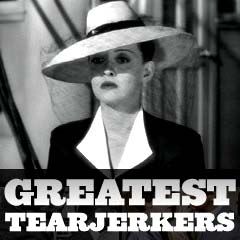|
The Greatest Tearjerkers of All-Time
|
|
Title Screen
|
Movie Title/Year and Brief Tearjerker Scene Description |
Screenshots
|

|
Dances with Wolves (1990)
- the downbeat ending in which Lt. John
Dunbar/Dances With Wolves (Kevin Costner) rode off from his adoptive
Sioux tribe with Stands With a Fist (Mary McDonnell), because of
the threat and danger he posed living with them; from a clifftop,
Wind in His Hair (Rodney A. Grant) shouted out a friendly goodbye
("Dances With
Wolves. l am Wind ln His Hair. Do you see that l am your friend?
Can you see that you will always be my friend?")
- the epilogue in which a scrolling placard revealed
that in the next 13 years, all of the Sioux were either wiped out
or put on reservations: ("Thirteen years later, their homes destroyed,
their buffalo gone, the last band of free Sioux submitted to white
authority at Fort Robinson, Nebraska. The great horse culture of
the plains was gone and the American frontier was soon to pass into
history")
|



|
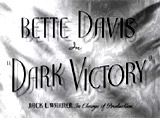
|
Dark Victory
(1939)
- the scene of Judith Traherne
(Bette Davis) realizing that her prognosis was "negative"
- Judith's true acceptance of
her coming death with her husband/Dr. Steele (George Brent) before
he left for a conference: ("You
know I used to be afraid. I died a thousand times. When death really
comes, it will come as an old friend, gently and quietly")
- the ending scenes of her comforting her best
friend Ann King (Geraldine Fitzgerald) in the garden: ("Don't,
Ann. I'm happy, really I am. Now let me see, is there anything else?
Oh yes, one more thing. When Michael runs Challenger in the National,
oh, and he'll win - I'm sure he'll win - have a party and invite
all our friends. Now let me see, silly old Alec, if he's back from
Europe, Colonel Mantle and old Carrie and, oh yes, and don't forget
dear old Dr. Parsons. Give them champagne and be gay. Be very very
gay. I must go in now. Ann, please understand, no one must be here,
no one - I must show him I can do it alone. Perhaps it will help
him over some bad moments to remember it. Ann, be my best friend.
Go now. Please")
- in her house, Judith greeted
her dogs and then made a request of maid Martha to leave her to die
in peace alone in the upstairs bedroom - with dignity: ("Is
that you, Martha? I don't want to be disturbed")
|



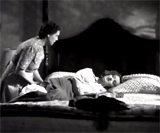
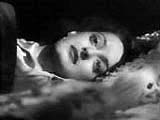
|
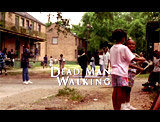
|
Dead Man Walking (1995)
- the heart-rending, awkward scene
in which Sister Helen Prejean (Susan Sarandon) visited the family
of the girl that convicted killer Matthew Poncelet (Sean Penn) had
murdered, and parent Clyde Percy's (R. Lee Ermey) hostile
incredulity at the nun's counseling of Matthew and her claim that
God forgave everyone: ("Are you a Communist?")
- comforting nun Sister Prejean's poignant words to
Matthew before he took a walk to the execution room: ("Look, I want
the last thing you see in this world to be a face of love, so you look
at me when they do this thing. You look at me. I'll be the face of love
for you")
- the tearjerking ending at the Louisiana prison,
including Matthew's last words before he died from
lethal injection while strapped on a cross-shaped gurney, as victims'
families and the comforting nun witnessed the capital punishment behind
a glass window: ("Mr. Delacroix, l don't
want to leave this world with any hate in my heart. l ask your forgiveness
for what l done. lt was a terrible thing l done in taking your son
away from you...Mr. and Mrs. Percy. l hope my death
gives you some relief. l just wanna say l think killin' is
wrong no matter who does it. Whether it's me or y'all or your
government...")
|


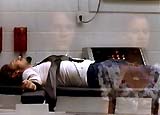
|

|
Dead Poets Society (1989)
 #43
#43
 #20
#20
- the moving tribute/protest by
the Welton Academy students, led by the formerly timid and tongue-tied
betrayer Todd Anderson (Ethan Hawke), over the expulsion of eccentric,
unorthodox 1959 Vermont prep school English teacher Mr. John Keating
(Robin Williams), when they stood on their desks in front of the
school's headmaster Mr. Nolan (Norman Lloyd) and recited Walt Whitman's "O
Captain! My Captain!"
in an emotional chant
|

|

|
Death in Venice (1971, It.) (aka
Morte a Venezia)
 #96
#96
- the beautifully shot, quiet and lonely
death scene of aging, avant-garde German composer Gustav von Aschenbach
(Dirk Bogarde) slumped on a deck chair on a Venice beach (accompanied
by music from a Gustav Mahler symphony) dying of heart failure with
dark hair dye dripping down his sweaty, chalk-white face, while lovingly
watching an angelic-looking teenaged boy Tadzio (Bjorn Andresen)
on the beach who pointed out toward the horizon of the ocean - Gustav's
expression mixed contentment, pain, and acceptance
|
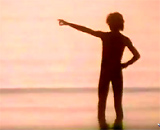
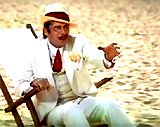
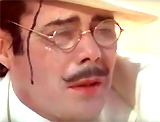
|

|
The Deer
Hunter (1978)
 #26 #26
- the final poignant and emotional
scene at the breakfast wake in Welsh's Bar of mourners following
Nick's (Christopher Walken) death (while playing Russian Roulette
in a Saigon back alley) after his body was brought home for the
funeral - everyone was awkwardly silent, disillusioned, moody and
overtaken by grief. As they prepared breakfast, the community of
hardened survivors amidst the disfiguring tragedy of the failed
war picked up the impromptu hummed tune of God
Bless America and thereby comforted each other and healed each
other's wounds by singing the words to the familiar and naively patriotic
anthem - everyone joined in. At first, they were embarrassed, but
then uplifted and renewed by the singing of the ritualistic song
- they reverentially raised their beer mugs to Nick, as best friend
Michael (Robert De Niro) toasted: "Here's to Nick,"
quietly understanding that he paid the ultimate price for his patriotism
- their ordeal was over. The film ended and freeze-framed with their
mugs held in mid-air as a toast
|


|
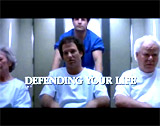
|
Defending Your Life (1991)
- the scene in which yuppie Daniel Miller (Albert Brooks),
in the temporary 'afterlife' of Judgment City following a fatal traffic
accident, learned that he was returning to Earth to be reincarnated,
knowing that his angelic newfound lover Julia (Meryl Streep) would "move
on" to the next higher plane of existence without him
|

|
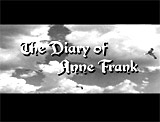
|
The Diary of Anne Frank (1959)
- the story of the Frank family
hiding out for two years in an attic in Nazi-occupied Holland,
including young idealistic and innocent 13 year-old Anne (Millie
Perkins) - in the opening scene, Anne's father Otto (Joseph Schildkraut),
the only survivor, returned to the Amsterdam attic to retrieve
Anne's diary, which provided the main body of the film through
flashbacks and voice-over narration, with Anne's famous line of
optimistic dialogue at the film's conclusion: ("in spite of
everything, I still believe that people are really good
at heart")
- the tragic ending in which the family rejoiced that
the war was almost over and then were found by the Nazis and sent
to concentration camps - they watched in stunned silence as the bookcase
entrance to the attic was broken into by the Nazis and they were
seized
|




|

|
The Diving Bell and the Butterfly (2007,
US/Fr.) (aka Le Scaphandre Et Le Papillon)
- an awe-inspiring, yet tearjerking sad film about Elle French
magazine editor Jean-Dominique Bauby (Mathieu Amalric) who suffered
a debilitating stroke at the age of 43 that left him with "locked-in" syndrome
- Jean-Do's glimpse of himself in a mirror,
thinking to himself: "God,
who's that? Me?" and then commenting internally about his shock: ("I
look like I came out of a vat of formaldehyde. How awful!").
As he recovered but remained restricted, immobile and frustrated
(comparing his mind to a diver in a bulky, imprisoning and restrictive
deep-sea suit or outfit, his body shell), he often would be wheeled/carried
out (seen externally) to watch his children (unaffected by his slumped
over torso and twisted face) playing on the French coastline beach
-- with his son wiping the saliva-drool from his lip
- in one of the
film's most affecting scenes, Jean-Do listened by speaker phone to
his frail, forgetful, and estranged 92 year old father (Max von Sydow)
- both were trapped in their lives in similar ways: ("It's impossible
to talk like this. I forget everythng I want to say...I've had a
thought about us. We're in the same boat. I'm stuck in this apartment,
unable to use the stairs...You see, we're both locked in. You in
your body, me in my apartment")
- the
final scene of Bauby's death just ten days after publication of his
painstakingly-written book, the film's title
|





|
